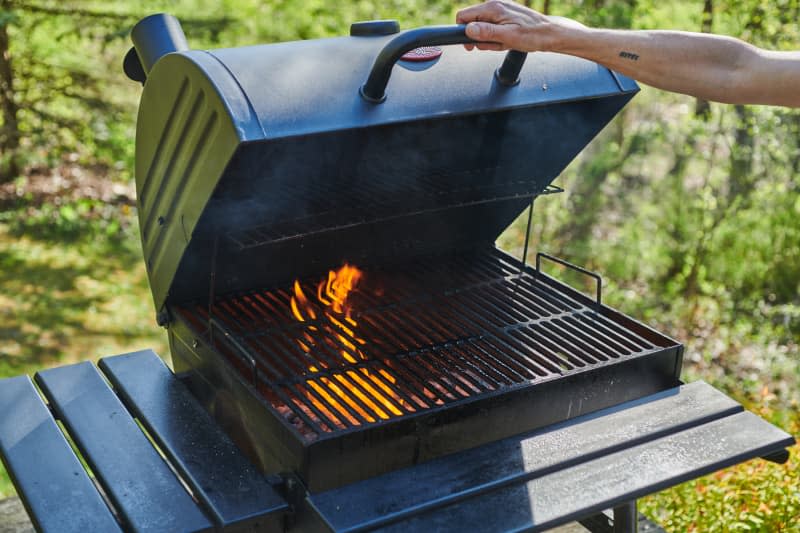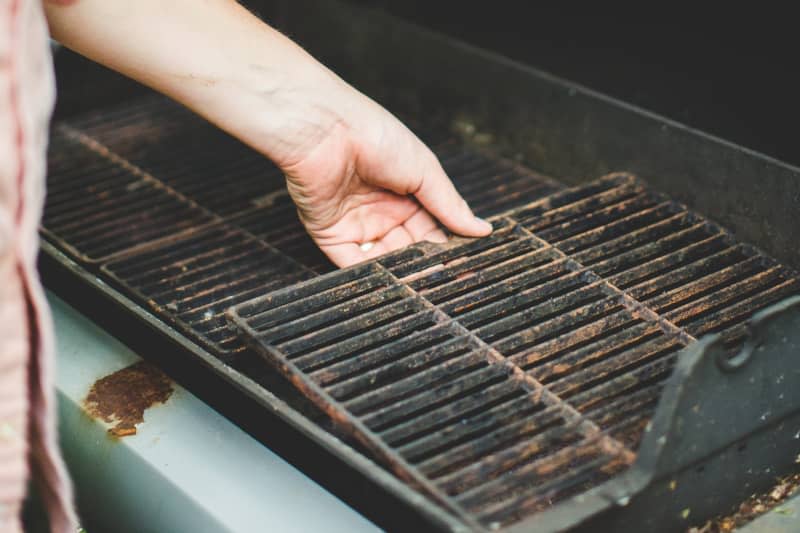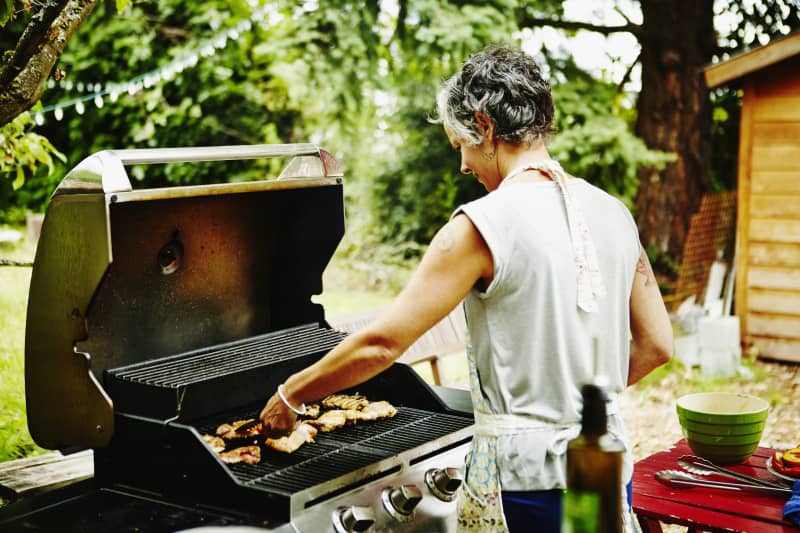The Most Effective Way to Clean a Grill (It’ll Be Summer-Ready!)

Grilling outdoors might keep your kitchen cleaner, but there’s still cleanup to do after a barbecue or cookout. Make it a habit to clean your grill before and after cooking so that your grill grates are free of food debris and grease. After all, you want grill marks on your food — not the crumbs of the last meal! Here’s how to clean a grill properly.
Table of Contents

How to Clean a Grill with Grates
Every grill master has their cleanup preference, but here are a few popular methods in the order in which they should be done. Cleaning a grill is easier when it’s hot — except for a flat-top grill, which should be cold — which is why most cleaning is done after the cooking. However, do cut the power source on a gas or propane grill before you clean it. Stand back from any steam that is likely to ensue while using any liquid to clean the grates.
Prep the Grill with an Onion and Potato
Perhaps grilled potatoes and onions were already on the menu for your outdoor feast, but even if they weren’t, you’ll want to have one of each on hand to clean your grill before cooking. Start by slicing an onion in half and spear it with a fork on the round side. Run the cut side of the onion up and down the heated grill grate to remove any grease or particles. Then, do the same thing with the cut side of a potato.
Scrub after Grilling with a Brush or Pad
Scrub your grill with either a brush or pad. If you prefer a brush, choose one with a long handle so it’s easier and safer to scrub off food residue from hot grill grates. (If you have a flat-top grill, check the manual to see if you can use this without damaging the surface.)
Use caution when using wire grill brushes, as fibers can sometimes loosen and get stuck on grill grates. If the idea of wire grill brushes scares you, though, opt for something gentler (and wire-free) like Scotch-Brite’s Heavy Duty Grill & Outdoor Scrubber. This metal-free scrubber has a mineral coating that removes grease and burnt food particles easily. It’s fine for charcoal, gas, and electric grills, and you can even scour your barbecue tools with it. Use it gently on a flat-top so you don’t scratch the surface.
You can use the grill brush or pad on its own, but to hurry the process along, dip it in an easy-to-make cleaning solution. Again, if you have a flat-top grill, you should check the manufacturer’s guidelines to see what can or can’t be used on that surface, but in general these are good options for grills with grates.
Dish soap and water: Just as this dynamic duo can break down grease on dirty dishes in the sink, it can tackle grill grates with ease. Dip the brush or scrubber in some soapy water and start scrubbing — just lean out of the way of that steam. If your grill grates are removable, go ahead and fill a bucket with soapy water and let them soak.
Vinegar solution: Sam Ferguson, product manager at Brisk It, a smart grill company, suggests mixing a one-to-one solution of water and vinegar and spraying it on the grates. The acid will help to loosen up the food and grit left behind on the grates, which means less scrubbing for you.
Sweep Out Ash with a Hand Broom or Small Shop-Vac
If the idea of emptying ash from a wood pellet or charcoal grill is distasteful, David Figueroa, grill master, professional chef, and co-founder of Melinda’s Hot Sauce, has some tips. His tool of choice is a hand broom, which he calls “indispensable for sweeping away that pesky ash buildup, the arch-nemesis of any grill’s longevity.”
For the spots a hand broom can’t reach, Figueroa says a rechargeable blower or a small Shop-Vac does the trick. He recommends dumping out the ash in a galvanized bucket with a lid.
Cleaning a Gas Grill vs. a Charcoal Grill
Cleaning methods are the same for both gas and charcoal grills, although the residue that gets left behind requires some attention.
Charcoal grills leave behind dry ash on the grates. It usually flakes off the grate easily, but this means you’ll have to empty the grill each time you’re done cooking. “A clean, empty firepot ensures that your next cook will ignite and burn effectively,” says Ferguson.
You don’t have to worry about ash with a gas grill, but there’s still plenty of grease to contend with. Grease and an open flame are never a great thing, so if you want to prioritize perfect grill marks and your safety, it’s best to keep those grates grease-free with one of the methods discussed above.
What to Know About Cleaning Other Types of Grills
Although it’s likely more backyards have gas and charcoal grills, you may be interested in knowing how to clean other grill types.
Electric grills: Can typically be wiped down with a sponge or damp cloth — don’t forget the drip tray!
Infrared grills: Are powered by propane or natural gas and should be cleaned just like a gas grill. Avoid anything abrasive.
Wood pellet grills: Make sure to swap out the disposable inserts, like the drip tray, to avoid a grease fire. “It’s always a great idea to complete a thorough cleaning of your pellet grill before cooking at temperatures at or above 400 degrees Fahrenheit,” says Ferguson.

Cleanup Tips and Tricks for the Grill Master
Here are some tips and tricks for getting the cleanest grill in the neighborhood, per Ferguson.
Use gloves. Grease and ash are messy to deal with, so pull on some rubber gloves — Ferguson says opt for disposable powder-free ones — to keep clothes and skin smudge-free.
Invest in cleaning tools and supplies. If your backyard becomes your kitchen in the summertime, it’s worth spending a bit of money on tools and supplies that will make cleanup a breeze, as you’ll be doing it often. Ferguson agrees with Figueroa on the Shop-Vac and says you could get a mini one for around $40 — totally worth the investment.
Use any self-cleaning options. “Let the grill do the work,” says Ferguson. You can also check your grill’s operating manual to see if any other self-cleaning options will make your life easier after a cookout, but he suggests running the grill at 400 degrees Fahrenheit for 20 to 30 minutes to remove any stubborn food and grit.
Grill cleanup takes mere minutes when you do it regularly, so be sure to keep the right tools and supplies on hand so that you’re always ready to host a backyard feast.

